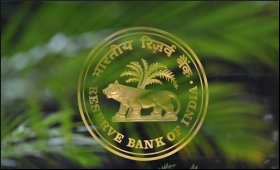|
|
|

|
Currency management exercise, not demonetisation: RBI to Delhi HC on 2K note issue
|
|

|
|
| Top Stories |
 |
|
|
|
IANS | 26 May, 2023
The Reserve Bank of India (RBI) on Friday told the Delhi High Court that
its decision to withdraw Rs 2,000 notes from circulation is only a
"currency management exercise and not demonetisation".
The
central bank defended its decision on a PIL filed by petitioner lawyer
Rajneesh Bhaskar Gupta challenging RBI's decision. The PIL argued that
it lacks the independent authority, as per the RBI Act, to make such a
decision.
Appearing for the bank, Senior Advocate Parag P.
Tripathi urged before the court that the matter be heard on a later date
as the bench has already reserved its judgment in a similar PIL by
petitioner lawyer Ashwini Upadhya.
"This is a currency management
exercise and not demonetisation. The bench has earlier reserved
judgment in a matter. I am suggesting that let that order come and we
can have it after that. Most of what is being contented would have been
dealt with it there. It is the pure nature of economic policy," Tripathi
said.
The petitioner has contended that the withdrawal of the
banknotes after 4-5 years, with a specific deadline, is deemed "unjust,
arbitrary, and contrary to public policy".
"This is beyond the
jurisdiction of the RBI. There is no provision in the RBI Act saying
that RBI can take such a decision independently. I would have understood
if the central government had taken the decision," the petitioner said.
After hearing the parties, the court posted the matter for next hearing on May 29.
The parties were asked to submit a short note in the matter.
"Counsel
for the RBI has informed the court that another petition with the same
subject matter has been heard. He prays for listing on Monday. List on
Monday," the court said.
The PIL says: "It is respectfully
submitted that the RBI, as Respondent no 1, does not possess independent
power under the Reserve Bank of India Act, 1934, to direct the
non-issue or discontinuance of any denominational value banknotes. Such
power is exclusively vested with the Central Government, as stated in
section 24 (2) of the RBI Act, 1934."
The PIL highlights that the
circular in question fails to indicate that the decision to withdraw
the banknotes has been made by the central government.
It argues
that the RBI has provided no explanation other than the "Clean Note
Policy" for taking such a significant and arbitrary step of withdrawing
the banknotes from circulation, without adequately considering the
potential repercussions for the general public.
Referring to the
provisions of the RBI's clean note policy, the PIL points out that
damaged, counterfeit, or soiled banknotes of any denomination are
typically withdrawn from circulation and replaced with newly printed
ones.
"However, in the present case, only the Rs 2,000
denomination is being withdrawn within a specific deadline, without any
indication of the RBI introducing a similar replacement banknote into
circulation," advocate Gupta further emphasises in the PIL.
The
PIL raises concerns over the impact of withdrawing the Rs 2,000
banknote, claiming that small vendors and shopkeepers have already
ceased accepting it.
It further argues that the RBI has not
provided any clarification regarding the benefits to either the RBI or
the national economy from withdrawing the Rs 2,000 denomination. The PIL
also drew attention to the well-known hardships faced by citizens
during the demonetisation of Rs 500 and Rs 1,000 notes in 2016.
"It
is respectfully contended that the Rs 2,000 denomination, printed in
2016 and thereafter, remains in excellent condition with robust security
features and does not necessitate withdrawal from circulation, be it
under the Clean Note Policy or any other grounds. Furthermore, the Clean
Note Policy specifically mandates the withdrawal of damaged,
counterfeit, or soiled banknotes, rather than the withdrawal of all
intact banknotes," Gupta states in the PIL.
The PIL also
highlights that a significant amount of public funds have been utilised
for printing the Rs 2,000 notes, which will go to waste as a result of
their withdrawal.
"It is respectfully argued that there is a
possibility that the RBI's challenged notification/circular may induce
anxious citizens to queue up at banks across the country during the hot
weather of May, June, and July. This situation could lead to the loss of
numerous lives, similar to the period of demonetisation in 2016 when
over 100 citizens lost their lives due to the incorrect policy decision
of demonetising Rs 1,000 and Rs 500 notes by the Central Government.
Now, a similar scenario is unfolding in the name of the RBI's Clean Note
Policy, despite the absence of any statutory authority," Gupta argues.
|
|
|
| |
|
|
|
|
|
|
|
|
|
|
|
|
|
|
| |
| Customs Exchange Rates |
| Currency |
Import |
Export |
US Dollar
|
84.35
|
82.60 |
UK Pound
|
106.35
|
102.90 |
Euro
|
92.50
|
89.35 |
| Japanese
Yen |
55.05 |
53.40 |
| As on 12 Oct, 2024 |
|
|
| Daily Poll |
 |
 |
| Do you think Indian businesses will be negatively affected by Trump's America First Policy? |
|
|
|
|
|
| Commented Stories |
 |
|
|
|
|
|
| |
|